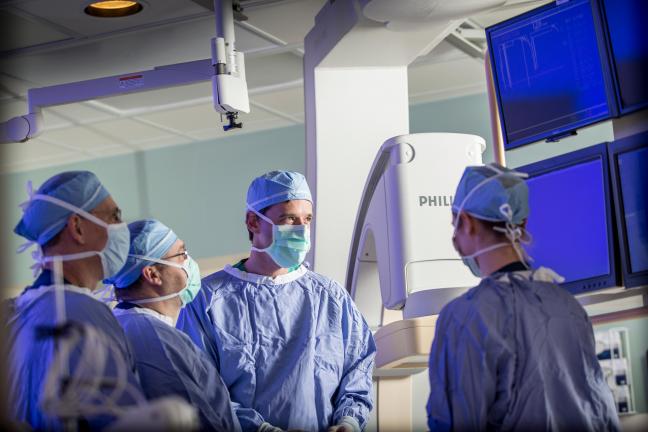In the Interventional Cardiology and Structural Heart Disease Program, our specially trained cardiologists offer you the latest non-surgical, catheter-based procedures—or interventions—to address diseases affecting the heart's arteries and structure.
The Cardiac Catheterization Laboratory in the Heart and Vascular Center provides the region's highest level of interventional cardiology diagnostic and treatment technologies. We perform the full range of procedures from low-risk to extremely high-risk coronary and structural heart interventions, some of which are only available through clinical trials. The laboratory is staffed 24 hours a day, 365 days a year, and provides scheduled procedures as well as emergency and emergent procedures.
The DHART (Dartmouth Hitchcock Advanced Response Team) transports you from regional community hospitals to the Catheterization Laboratory.
How our interdisciplinary, shared-care model impacts your care
Our team of board-certified interventional cardiologists offers you a full range of noninvasive diagnostic tests and treatment options, and partners with cardiac and vascular surgeons, as well as imaging and electrophysiology specialists, to deliver new, minimally invasive therapies for your heart, including:
- Interventional cardiology: advanced procedures for coronary artery disease include expert emergency care for ST-elevation myocardio infarction (STEMI) heart attacks, novel treatment options for chronic total occlusions (CTO), and the full range of percutaneous coronary interventions (PCI), including complex cases requiring heart and lung support during your procedure
- Structural heart disease: New devices and minimally invasive procedures for structural heart disease including transcatheter aortic valve replacement (TAVR), mitral valve repair, and left atrial appendage closure.
Our collaborative approach to care ensures optimal treatment approaches and outcomes for you. We participate in the diagnosis and treatment of valvular disease through the Valvular Heart Disease Program, and in peripheral and endovascular interventions outside the coronary arteries in collaboration with our vascular surgeons. We also are part of the Pulmonary Embolism Response team to ensure a standard approach to pulmonary embolism care across our network of referring hospitals.
How our clinical research impacts your care
As part of an academic center, our program is focused on research and clinical trials to improve your care. Current cardiology clinical trials include studies of new devices and new treatment strategies for coronary and structural heart disease, on the use of shared decision making in structural heart disease, and on outcomes studies through the Northern New England Cardiovascular Disease Study Group.
